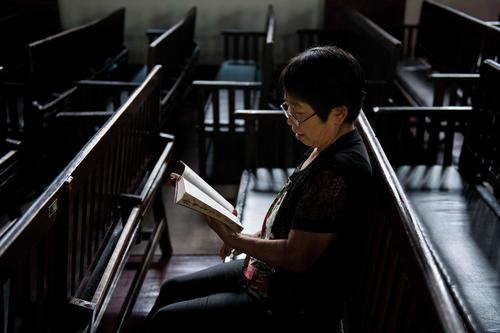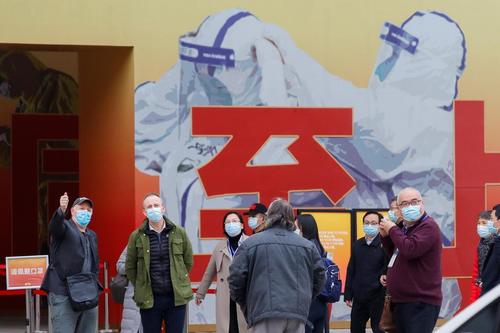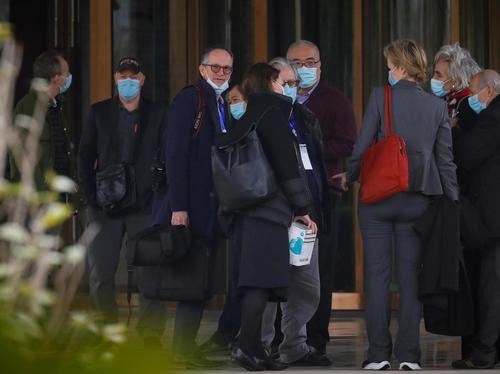Authored by Tom Luongo via Gold, Goats, ‘n Guns blog,
When Facebook censors Ron Paul, or Twitter bans President Trump, is that censorship?
Or because these are private companies, does that automatically make it NOT censorship?
Amazon banned Parler, but is it their right as a private company to choose their customers?
That’s the crux of the issue I need to address with you in today’s post-Trump world of social media.

Because make no mistake “Big Tech” repression is a foundational problem facing any society that considers itself even somewhat free. In the wake of the allowed ‘assault on the Capitol’ and the confirmation of Joe Biden as the 46th president of the U.S., the big tech firms which control access to speech went ballistic.
Conservatives along with President Trump himself were wiped from the public square. Any mention of the election being stolen or open support on Twitter of Trump himself was flushed down the memory hole.
This is censorship of the highest order by these firms to put parameters around political speech in the U.S. where such a right is enshrined in the Constitution. None of it is constitutional.
But the problem is far deeper than that. The deplatforming of Parler, one alternative social media platform to Twitter, via corporate collusion by Apple, Google and Amazon was something far more sinister than Twitter silencing the sitting president of the U.S.
This was a blatant hit job by companies stifling competition in the public square for hosting material which is constitutionally protected as ‘free speech.’
But these firms, especially Amazon, who terminated Parler’s server hosting agreement with 24 hours’ notice, lazily applied their vague and ever-changing ‘Terms of Service” to single out Parler and hide behind their status as a private company.
The worst part about this is that libertarians see this as a rational and defensible free market action. And for years adolescent libertarian arguments about corporations being private actors preferable to governments have now been turned around by authoritarians who hang us with our own words.
And we wonder why conservatives look at us like we have four-heads when we make such arguments?
When this attack on free speech began, during the 2016 presidential campaign with the first deplatforming of alt-right provocateurs like Richard Spencer and Andrew Anglin of the Daily Stormer website, it was obvious then that these were dry runs for the mass action we’re seeing today, in the name of creating an information-free literal one-party police state.
It was this that prompted former Silicon Valley programmer Andrew Torba to start Gab. Crazed liberals then said, “If you don’t like Twitter, leave and build your own.”
So, he did. And after the attack on the Pittsburgh Synagogue in 2018, Gab was given the even worse treatment than Parler got last week.
They survived that.
All the while myself and people like Torba were screaming about the duopoly controlling the on-ramp to the mobile web, and no one cared. But we could see this day coming.
And now it’s here.
But this is most certainly not a private property issue as much as it is a contract law issue allowed to fester because of government interference into the marketplace for communications.
Government interference altered the landscape these companies operate in. The grew to the size they are now because of government largesse and federal and state tax revenue into the networks and systems they depend on.
It doesn’t matter that the duopoly is Google and Apple. It could have been Palm and Microsoft. Or Blackberry and IBM. What matters is that the environment wasn’t a level playing field between the companies and the people using the services.
They were paying not only for access but at the same time subsidizing the revenue streams by accepting costs these companies outsourced to government.
It is a cozy arrangement.
The companies outsource their fixed costs and the government outsources their censorship desires that pesky First Amendment forbids them from doing directly.
No wonder the response to the allowed assault on the Capitol was so swift and coordinated.
Think it through folks.
Amazon’s AWS doesn’t become a dominant player without those vaunted contracts with the CIA. Parler, at a minimum should have an expectation of service per any legal contractual arrangement, and as such is due damages from Amazon for unilaterally breaching that basic trust.
Facebook doesn’t grow to become the monster it is without strategic investments by quasi-governmental companies like Goldman-Sachs and Morgan Stanley.
Google doesn’t become the ad revenue generating machine if it had had to properly pay its bandwidth costs for the content they forced on us.
Trump nixing ‘Net Neutrality’ put some of that onus back on them, giving ISP’s some latitude to price usage according to their needs rather than Google’s.
All of the above companies, including Microsoft, have been chosen by our government to succeed in this tilted marketplace.
Apple doesn’t dominate the mobile internet in the U.S. without all those user fees and taxes tacked onto the cost of your monthly cellphone bill.
If these companies were operating on their own private satellite and wire networks then they would absolutely be in the right, via the application of private property rights, to set whatever terms of service they wanted.
I, as a libertarian, fully support that.
And also, as a libertarian, understand that public property always creates a tragedy of the commons scenario.
But when you operate in the public sphere, when you move your goods and services on the digital equivalent of the public road system (not a digression I want to get into today) and your corporate charter exists within the framework of U.S. and state contract law it is clear that these companies are neither wholly private entities with respect to their customers nor neutral actors trying to enforce public decency standards.
They are acting in their best interest to stifle competition – Gab, Parler, Minds, etc. – while setting precedents to allow for even further restrictions of speech through lawfare thanks to a complicit and fully cowed legal system.
And herein lies the smart path to reining them in, if it is at all possible at this point, since it’s clear the Biden Administration is ready to reframe all speech critical of the U.S. government as ‘domestic terrorism’ giving all of these companies the legal justification into the future to unperson all dissent.
Removing their Section 230 immunity under the Communications Decency Act is paramount. It will not happen now. The government is in on the grift, folks, so looking ahead to the 2022 election cycle isn’t an option.
They just proved to you your vote doesn’t count, so it means hitting them in the only place they truly care about, their bottom lines.
So, the first thing to do is sue them into the ground. It will be up to the people themselves to hound these companies through both contract law violations and shareholder revolts because they have done irreparable damage to their brands and their future revenue streams.
That is what has to happen right now. Parler’s suit against Amazon is a good start. A class-action lawsuit by every small business in America now wondering about Amazon’s policies should end this nonsense quickly.
A good judge in a sympathetic jurisdiction should side with anyone making a strong case that modern tech company Terms of Service are ‘contracts of adhesion,’ defined as contracts entered into where one party is so much stronger than the other the weaker party is, in effect, coerced into signing it.
The second thing to do is to simply jack-out. Put the screen down. Stop using it as a substitution for real communications and pull back from the brink.
De-google your life, as I have. Close your Facebook account permanently. You will feel better immediately, trust me. I did this two years ago, to the detriment of the marketing efforts of my business, and I have never looked back.
If you need a social network, use Twitter for keeping tabs on things but save your thoughts and your content for Gab or some other, smaller private community you are a part of.
Being a global citizen is a canard they sold us as some true net positive. But it was something designed wholly to drive us mad and deracinate us to the point of having no home, no culture and no real friends.
It’s no wonder they are trying so hard to shut off the escape routes and only allow certain platforms to exist forcing us to interact with people we don’t like while locked in our homes over a wholly contrived public health emergency.
It was always part of the globalist plan.
Ending this starts with the very libertarian idea of simply opting-out. We don’t need to be plugged into their reality-generating nightmares every moment of every day.
But the thing about the web is that it is built on protocols which are themselves censorship resistant. So, the tyrants of today will be the footnotes of tomorrow. We’ve seen early attempts at censorship-proof blockchain platforms like Steemit. It’s still running even though its growing pains nearly killed it.
The next great service is just around the corner because necessity is the mother of innovation. But the first step is accepting the fact that they’ve won this round and it is now time to change the rules of the game.
P.S.: If you want to see what this looks like, just look at what the guys at Wall Street Bets are doing to the capital markets today. Brokerage outages, trading suspended, newly-minted millionaires.
All because a bunch of hedgies got over-confident of their one-way skimming and thinking no one would press their luck to the breaking point.
They have and it is glorious.
You beat them by turning their supposed advantages and bought-and-paid-for rules of the game back on them.
* * *
Join My Patreon if you like watching the bad guys take it on the chin
Donate via crypto:
BTC: 3GSkAe8PhENyMWQb7orjtnJK9VX8mMf7Zf
BCH: qq9pvwq26d8fjfk0f6k5mmnn09vzkmeh3sffxd6ryt
DCR: DsV2x4kJ4gWCPSpHmS4czbLz2fJNqms78oE
DASH: XjWQKXJuxYzaNV6WMC4zhuQ43uBw8mN4Va
XLM: GC4S6XUG6CGI7DLKFTLCUKIKYS3BHYE56AF7BQRIWX5EZM355JQYDRHD













